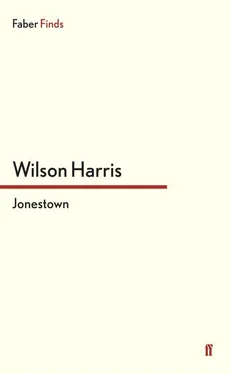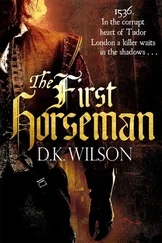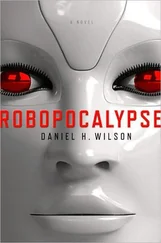Wilson Harris - Jonestown
Здесь есть возможность читать онлайн «Wilson Harris - Jonestown» весь текст электронной книги совершенно бесплатно (целиком полную версию без сокращений). В некоторых случаях можно слушать аудио, скачать через торрент в формате fb2 и присутствует краткое содержание. Год выпуска: 2011, Издательство: Faber & Faber, Жанр: Современная проза, на английском языке. Описание произведения, (предисловие) а так же отзывы посетителей доступны на портале библиотеки ЛибКат.
- Название:Jonestown
- Автор:
- Издательство:Faber & Faber
- Жанр:
- Год:2011
- ISBN:нет данных
- Рейтинг книги:5 / 5. Голосов: 1
-
Избранное:Добавить в избранное
- Отзывы:
-
Ваша оценка:
- 100
- 1
- 2
- 3
- 4
- 5
Jonestown: краткое содержание, описание и аннотация
Предлагаем к чтению аннотацию, описание, краткое содержание или предисловие (зависит от того, что написал сам автор книги «Jonestown»). Если вы не нашли необходимую информацию о книге — напишите в комментариях, мы постараемся отыскать её.
Jonestown — читать онлайн бесплатно полную книгу (весь текст) целиком
Ниже представлен текст книги, разбитый по страницам. Система сохранения места последней прочитанной страницы, позволяет с удобством читать онлайн бесплатно книгу «Jonestown», без необходимости каждый раз заново искать на чём Вы остановились. Поставьте закладку, и сможете в любой момент перейти на страницу, на которой закончили чтение.
Интервал:
Закладка:
Wilson Harris
Jonestown
For Margaret and Sam and to Zulfikar Ghose and Helena de la Fontaine
There was a man went out one night a-seeking for a soul
And oh he met a skeleton, a grim and grisly skeleton
A-sitting in a hole.
The man who was a gentleman and always most polite
Said ‘since you’re wise and old dear sir, I venture to be bold dear sir,
And ask your help this night.
I wonder could you tell me sir where I might reach my goal,
A place where I might hope to find a something for my peace of mind,
In short dear sir a soul.’
The skeleton looked very wise and rattled all its bones
And asked ‘do you require the thing for beggarman or thief or king,
De Havilland or Jones?’
‘Is that important?’ asked the man, expressing some surprise,
‘I hadn’t thought of class before, it’s just a soul I’m searching for,
I wouldn’t mind the size.’
The skeleton disdainfully it looked him up and down
And said ‘it’s very plain to see you’ve no perception of degree’
And frowned a bony frown.
‘The simplest thing that you can do is find yourself a hole,
And sit and watch the world go by and never mind the where or why
Or seeking for a soul.’
So down he sat for years and years upon a village green,
Until he was a skeleton, a very handsome skeleton,
The finest looking skeleton that ever had been seen.
Margaret Rose Harris, ‘Skeleton Ballade’The Maya Indians have been called an enigmatic people, and rightly so … How, where and when did this, the most important Stone Age culture, evolve? Why were all their cities, magnificently embellished by the most talented sculptors, abandoned? What is the message contained in their hieroglyphic script, the finest and most intricate of its kind known to us? … How was it possible for the Maya astronomers, the most outstanding of their time, to measure without the aid of any instruments the rhythmic movements of the heavenly bodies with an accuracy that amazes all the experts of our own day? Where were their skilled architects trained, and where did their sculptors learn the arts of carving? These and many other questions have as yet remained unanswered.
H. D. Disselhoff and S. Linne, Civilizations of Central and South America (Crown Publishers Inc., New York, 1960)There are other aspects of the Maya philosophy of time … What had gone before and what lay ahead were blended in a way that is baffling to our western minds. Mysticism is not now fashionable, and so writers tend to stress the material side of Maya civilization, but surely it is precisely these (to us) strange aberrations of Maya mentality which pose the most interesting questions.
J. Eric S. Thompson, Maya Civilization (University of Oklahoma Press, 1954)It means that … the future states of the Universe are in some sense ‘open’. Some people have seized on this openness to argue for the reality of human free will. Others claim that it bestows upon nature an element of creativity, an ability to bring forth that which is genuinely new, something not already implicit in earlier states of the Universe save in the idealized fiction of the real numbers. Whatever the merits of such sweeping claims, it seems safe to conclude that the future of the Universe is not irredeemably fixed. The final chapter of the great cosmic book has yet to be written.
Paul Davies, in Chaos, essays edited by Nina Hall (Penguin Books, London, 1988)Letter from Francisco Bone to W.H

Trinity Street
New Amsterdam
Dateless Day
Dear W.H.,
I have learnt of your sympathies for voyagers of the Imagination and trust therefore that you will undertake the task of editing the enclosed manuscript or book.
I am the only survivor of the ‘tragedy of Jonestown’, which occurred — as many people know — in late November 1978 in a remote forest in Guyana.
The Longman Chronicle of America tells of the ‘tragedy of Jonestown’ and of the scene of ‘indescribable horror’ which met the eyes of reporters from every corner of the globe when they arrived in stricken Jonestown after the self-inflicted holocaust engineered by a charismatic cult leader, the Reverend Jim Jones.
In my archetypal fiction I call Jim Jones Jonah Jones. All of the characters appearing in the book are fictional and archetypal. In this way I have sought to explore overlapping layers and environments and theatres of legend and history that one may associate with Jonestown.
Not all drank Coca-Cola laced with cyanide. Some were shot like cattle. Men, women and children.
Francisco Bone is a disguised name that I employ for myself. I suffered the most severe and disabling trauma on the Day of the Dead (as I see and continue to see in my mind’s eye the bodies in a Clearing or town centre in Jonestown on November 18). The shock was so great — I blamed myself for not taking risks to avert the holocaust — that though I was wounded a numbness concealed for some time the physical injury that I suffered. The consequences of such ‘numbness’ occupy different proportions of the Dream-book.
When I escaped I dreamt I was dead and gained some comfort from rhymes of self-mockery, from handsome skeletons, all of which helped to promote the theme of Carnival Lord Death in the Book when eventually I began to write it. One such self-mocking poem — which I came upon when I arrived in New Amsterdam before I had started writing — is the first epigraph that I use. That poem helped me to offset the hell of Memory theatre for a while and to join strolling players on a village Amsterdam green. I relished the Jest that I associated with eighteenth-century Dutch plantation owners who superimposed structures and promenades upon the bank of the Berbice River in the vicinity of New Amsterdam. When I arrived in 1985 to write my Dream-book I strolled on a promenade called village Amsterdam green that ran from the township to a mental hospital. Patients and townsfolk tended to stroll arm-in-arm dressed in masks of Bone at Carnival time. I sought a pleasant hole to simulate the grave into which I should have fallen on the Day of the Dead. Why me? Why did I survive? It was this thought that drove me to write … Questions as much as thought! No easy answers.
I feared to write in — and be written by — a demanding book that asserts itself in Dream and questions itself from time to time (even as I question the meaning of survival) as you will see as you read. One overcomes the fear of Dreams, I suspect, for I did not stop writing or being written into what I wrote …
I was obsessed — let me confess — by cities and settlements in the Central and South Americas that are an enigma to many scholars. I dreamt of their abandonment, their bird-masks, their animal-masks … Did their inhabitants rebel against the priests, did obscure holocausts occur, civil strife, famine, plague? Was Jonestown the latest manifestation of the breakdown of populations within the hidden flexibilities and inflexibilities of pre-Columbian civilizations? The Maya were certainly one of the great civilizations of ancient America and the fate of their cities — such as Palenque, Chichén Itzá, Tikal, Bonampak — has left unanswered questions. Teotihuacan in Mexico raises similar enigmas. The unsolved disappearance of the Caribs in British Guiana is another riddle of precipitate breakdown. And there are many others. The amazing story of the Arekuna Indian Awakaipu is well documented in Georgetown in the 1840s. Awakaipu persuaded representatives from many Indian peoples to offer themselves as a sacrifice at the foot of Mount Roraima in order to recover an ‘enchanted kingdom’.
Читать дальшеИнтервал:
Закладка:
Похожие книги на «Jonestown»
Представляем Вашему вниманию похожие книги на «Jonestown» списком для выбора. Мы отобрали схожую по названию и смыслу литературу в надежде предоставить читателям больше вариантов отыскать новые, интересные, ещё непрочитанные произведения.
Обсуждение, отзывы о книге «Jonestown» и просто собственные мнения читателей. Оставьте ваши комментарии, напишите, что Вы думаете о произведении, его смысле или главных героях. Укажите что конкретно понравилось, а что нет, и почему Вы так считаете.












